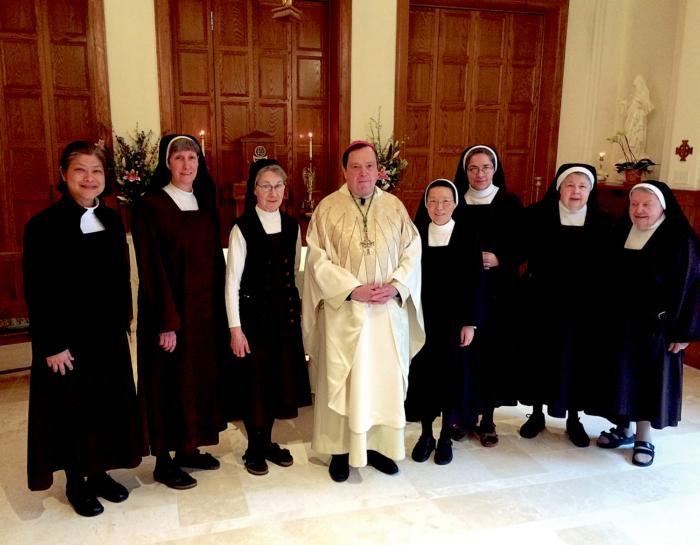Local
Boston Carmel -- solitude in the city
By Special to The Pilot
Posted: 3/10/2017


Merrimack Regional Bishop Robert Hennessey celebrated Mass and blessed the newly refurbished chapel of the Carmelite Nuns on Mount Pleasant Avenue, in the Hub's Roxbury section, in April 2015. Courtesy photo
Boston Carmel was founded in 1890 from the Carmel of Baltimore, one hundred years after the latter was established as the first foundation of religious women in the United States.
In November 1889, Archbishop John J. Williams of Boston was in Baltimore to preside at the opening Mass of the Catholic Congress celebrating the Centennial of the Catholic Hierarchy.
While in the city, he visited the Baltimore Carmelite Monastery. There, he first learned that the community had reached its full complement of sisters and was unable to accept a number of young women, many from New England, who were applying to enter. The nuns expressed their desire to found a monastery in Boston -- an idea immediately embraced by the Archbishop, who formally invited Baltimore Carmel to begin a foundation in Boston.
Five Carmelite nuns set sail from Baltimore for the new foundation in Boston on Aug. 23, 1890.
-- Mother Beatrix of the Holy Spirit (Camilla Magers) -- Prioress
-- Mother Angela of the Presentation (Josephine Dyer) -- Sub-prioress
-- Sister Gertrude of the Heart of Jesus (Gertrude McMaster)
-- Sister Augustine of the Mother of God (Eulalia Tuckerman)
-- Sister Alphonsus of the Heart of Jesus (Barbara Braun)
The founders stayed in their first location on Cedar Street for four years. On Sept. 25, 1894, they moved to their permanent location on Mount Pleasant Avenue, just a short distance away.
Several other monasteries were founded from Boston Carmel. These are located in Philadelphia, Penn.; Santa Clara, Calif.; Concord, N.H.; and Danvers, Mass.
Each person in Carmel is called to be our Lord's good friend, totally surrendered to God in a profound and complete "fiat!" -- yes! that allows God to use her as an instrument to carry out His divine plan of salvation for all people. "Therese of Lisieux and Elizabeth of the Trinity understood the act of total surrender to the triune God as the highest possible form of engagement on behalf of the world's salvation. They knew that this calling burrowed itself into hiddenness even as roots disappear into the ground. Above ground the visible Church and her activity feed from these roots." (von Balthasar)
The call to Carmel is a call to this hidden but powerful encounter with God. It is standing before God for all people and drawing them to His mercy and love. Every vocation is part of God's plan and is always a personal call that God speaks to a person's heart. First of all, one must discern the call to Carmel as a way of life for her. Some questions that might be helpful in the process of personal discernment are:
Do I have a deep desire for intimate friendship and union with the Lord?
Do I believe in the power and effectiveness of prayer as an apostolate in the service of God and of others? Am I willing to forego all forms of active ministry and give up seeing the 'results' of my work of prayer?
Does my desire to deepen my friendship with Jesus Christ enable me to:
Generously give myself to a life of sacrifice and self denial?
Live a life of solitude and silence that is balanced with sisterly sharing in community?
Generously and freely embrace a life of simplicity and poverty, chastity, and obedience to authority? Do I see these as means toward greater inner freedom?
Live a cloistered life: a life lived apart from the world's attractions? Can I live a life that has limits on personal contact with family and friends?
If you are inclined to respond affirmatively to these questions, God may be giving you a vocation to Carmel. At the time of personal discernment, it is always helpful to seek the advice and help of an experienced spiritual director to clarify the movements of your heart.
When one's desires for consecrated life are strong and seek to find expression in a life lived in community, a discernment process involving both the inquirer and the community begin.
Website: carmelitesofboston.org.